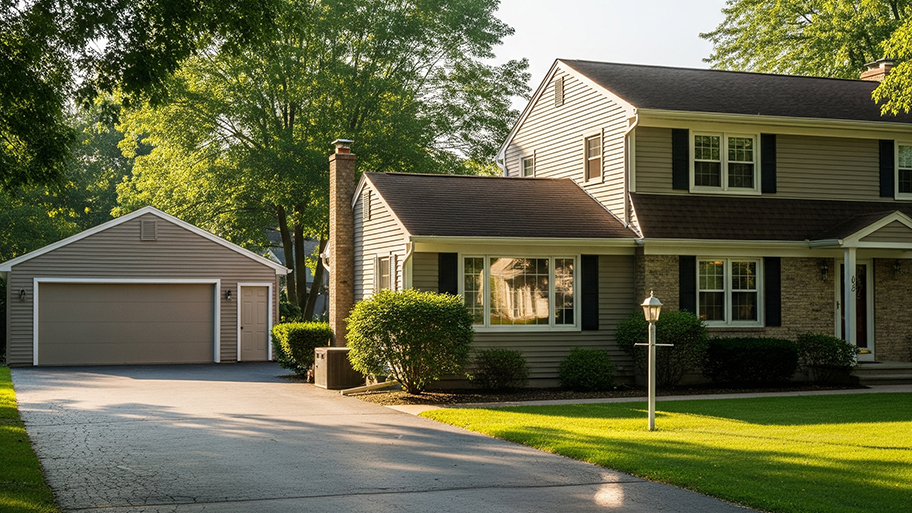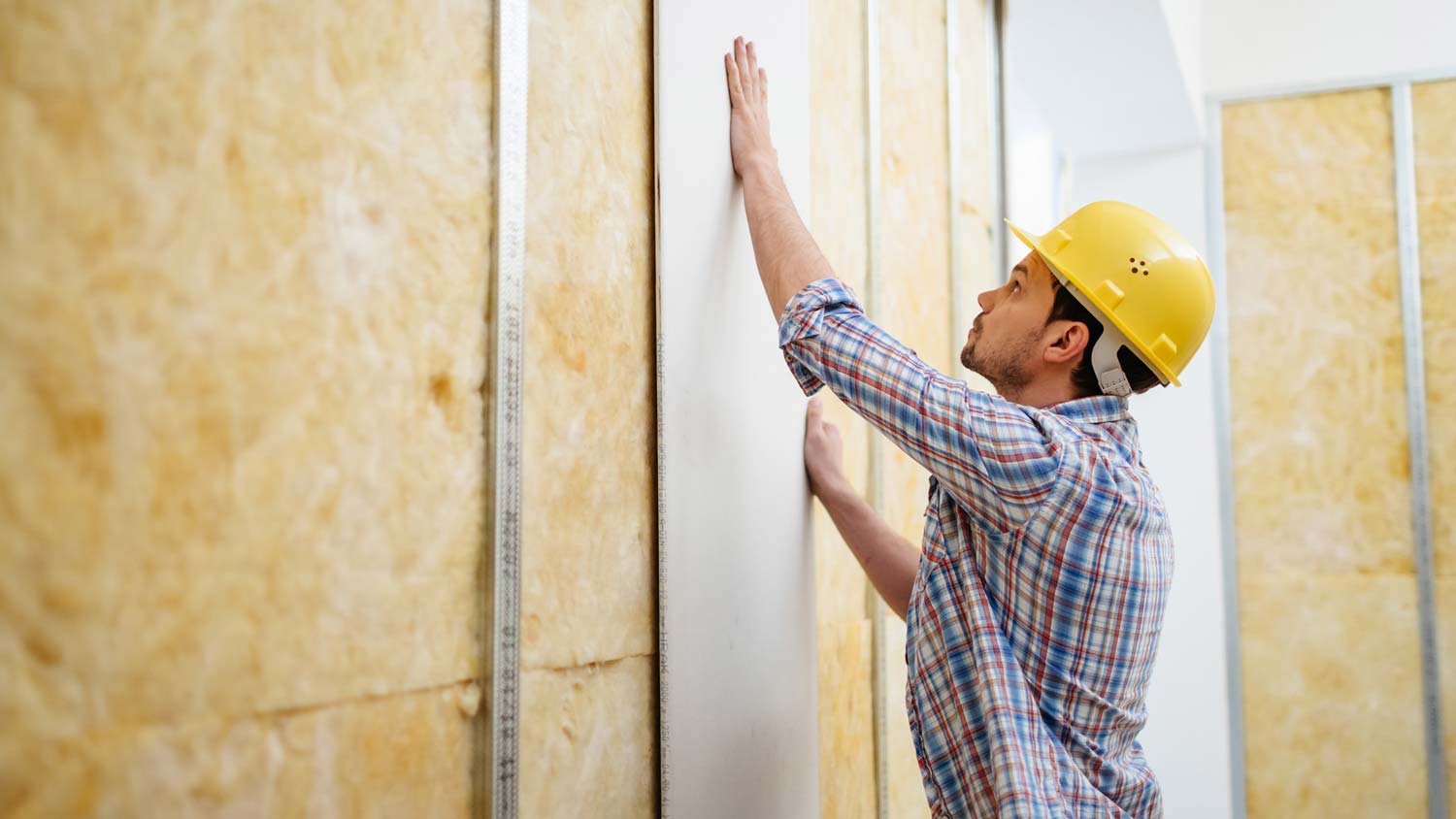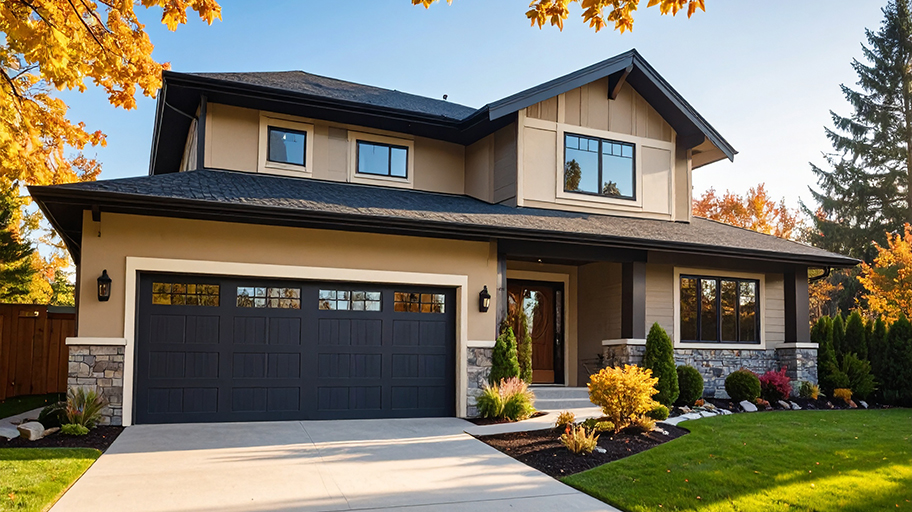
The cost to build a detached garage depends on the size, materials, labor, and more. Read this guide to learn more about detached garage costs.
The cost to drywall a garage is $1,100 on average, or between $360 and $1,700, depending on size and drywall type.


The biggest cost factors are the size of your garage, the type of drywall you choose, and the level of finish.
Expect to pay between $0.50 and $1.50 per square foot of drywall you need installed.
Don’t insulate behind the drywall unless you plan on heating and cooling your garage, as doing so will lead to moisture problems.
You may need type-X, fire-resistant drywall by code if your garage has solar batteries, EV chargers, or other potential fire hazards.
If you’re looking to give your garage space a facelift, a little drywall can go a long way. The average cost to drywall a garage is about $1,100 but often ranges between $360 and $1,700, depending on the amount of drywall you need and other factors. Adding drywall to your garage can also do more than boost the look of your space. Installing drywall can offer protection if you want to keep your vehicle and tools safe from a potential fire. To help you budget for drywalling your garage, we’ve rounded up some of the most significant cost factors.
Several factors influence the cost to drywall your garage, including the size of your garage, the drywall materials, the finish, existing features in your garage, labor, and your location. Let's break down each of these factors to help you tally up the total cost to drywall a garage.
Installing drywall costs between $1.50 and $3.50 per square foot, or an average of $2 per square foot, including labor. The size of your garage ultimately plays one of the largest roles in how much you will pay to install drywall. On average, a one-car garage will cost around $850, a two-car garage will cost around $1,100, and a three-car garage will cost around $2,000.
Refer to this chart for an idea of how much your garage might cost, and be sure to measure your garage’s dimensions to know the exact square footage and associated costs for your particular garage.
| Garage Size | Square Footage | Cost Range (with labor) |
|---|---|---|
| One-Car Garage | 240–380 | $360–$1,350 |
| Two-Car Garage | 360–480 | $540–$1,700 |
| Three-Car Garage | 700–860 | $1,050–$3,000 |
For a standard 4-by-8-foot panel, you could spend anywhere between $10 to $65 per panel for high-end drywall materials or between $0.30 and $2 per square foot, not including the cost of garage insulation or labor fees. If you opt for soundproofing drywall or drywall with extra water resistance, you’ll spend near the higher part of the price range, while standard drywall tends to cost between $10 and $25 per panel.

Drywall tends to run in thicknesses ranging from 1/2 to 5/8 inches. Prices reflect the thickness of the drywall panels, with 5/8-thick panels costing around $5 to $10 more apiece than 1/2-thick panels. Standard drywall is around 1/2 an inch thick, but most garages benefit from thicker, 5/8-inch drywall that offers more fire-resistant properties. This is why garage drywall with added fire resistance tends to run higher than standard drywall for other areas of the home.
If you have an unusually shaped garage, this could affect your drywall installation costs. The standard size for drywall sheets is 4-by-8-foot panels. If your garage has higher-than-average walls, then you may need to pay more to install custom or less available drywall sheets. Likewise, any windows, corners, garage ceiling openings, or doors in your garage mean cutting the panels to fit the shape of the walls or ceiling—all of which increases expenses.

The cost to finish drywall ranges from $0.50 to $1.50 per square foot with labor. If you know how to finish drywall and want to DIY it, a bucket of premixed joint compound costs anywhere from $10 to $25 and covers up to 450 square feet, and a roll of drywall tape costs around $5.
You’ll need to sand the compound after it dries and apply a second and a third coat of joint compound. So, factor in the cost of three rounds of joint compound and a roll of drywall tape for a rough total of $35 to $80.
Hiring a pro to install drywall in your garage will cost somewhere between $1.20 and $3 per square foot in addition to the drywall materials. Having a professional install your drywall panels accounts for 15% to 25% of the total cost of your project.
The cost of living in your area can also impact how much it costs to install drywall in a garage. For example, installing drywall in Los Angeles, California, costs an average of $2,200, while the average cost to install drywall in Austin, Texas, is $1,600. Factor in the going rates to hire a local drywall contractor for the most accurate estimates.
The average cost to remove drywall is between $0.30 to $0.45 per square foot. For a standard, two-car garage, you'll end up spending anywhere from $100 to $225 to remove old drywall in your garage.
Drywall is easy to ding—especially when it's in your garage. The cost to repair drywall falls between $300 and $900 on average. Patching a small hole in drywall costs the least to repair, while larger damage costs the most.
Texturing drywall by hand can cost between $0.50 and $2 per square foot. Light textures or textures applied via a spray application are the most budget-friendly and range in price from $0.50 to $1 per square foot. Heavier textures or hand-applied textures tend to cost double or even triple that of basic texturing, falling somewhere between $1.50 and $2 per square foot.
Adding texture to drywall in your garage requires more technique and skill than installing the drywall but can also add character if you plan on using your garage as a living space like an accessory dwelling unit.

If you drywall your garage yourself, you’ll pay $0.30 to $2 per square foot in materials or between $75 to $1,720, depending on the size of your garage, the thickness of the material, and whether you decide to add texture. If you hire a drywalling pro, you’ll pay an additional $1.20 to $1.50 more per square foot in labor fees.
But installing drywall is an intermediate DIY project that isn’t for everyone. If you don't feel comfortable installing it yourself, you're better off hiring a garage modeling contractor near you to do the work properly.
It costs about $50 to $75 per square foot to repair drywall in a garage if you hire a local drywall repair contractor. Some may charge hourly ($60 to $90 per hour), meaning repair costs can be quite low if the drywall damage is limited. Depending on the extent of the damage, you might be able to repair the garage drywall yourself using a kit that costs only $10 to $30. Here are some drywall repair tips if you’re up for the challenge.
Why consider drywall repair costs? It’s a whole lot cheaper to repair drywall in your garage than to remove existing drywall and have new drywall installed. If your garage already has drywall but it has holes from mistakes with tools or noticeable water damage from a past leak, you might be able to salvage some of the drywall and repair the damaged sections.
Addressing and repairing these smaller drywall problems can eliminate the need to install all-new drywall—and save you quite a bit of money.
Installing drywall can quickly become a cost-heavy investment. Fortunately, there are several ways that you can shave off costs from your drywall project. Here are some tips on how to save on drywalling your garage:
DIY your drywall installation. Installing drywall yourself can save you between 15% and 25%.
Don't add texture. Texturing drywall is an optional add-on. If you're just using your garage to park your car, then you might not need to texture the drywall.
Go for a light texture. If you do plan on using your garage for more than parking vehicles, you can save money by going with a light texture using a spray installation method.
Finish the garage drywall yourself. Finishing your garage’s drywall yourself is another way to save on labor costs.
Choose a thinner drywall sheet. Thinner drywall sheets cost $5 to $10 less per panel than thicker sheets, but thinner sheets may be less fire -and moisture-resistant.
Home is the most important place on earth, which is why Angi has helped more than 150 million homeowners transform their houses into homes they adore. To help homeowners with their next project, Angi provides readers with the most accurate cost data and upholds strict editorial standards. We extensively research project costs to develop the pricing data you see, so you can make the best decisions for you and your home. We rely on reputable sources, including the U.S. Bureau of Labor Statistics, academic journals, market studies, and interviews with industry experts—all to ensure our prices reflect real-world projects.
Want to help us improve our cost data? Send us a recent project quote to [email protected]. Quotes and personal information will not be shared publicly.
From average costs to expert advice, get all the answers you need to get your job done.

The cost to build a detached garage depends on the size, materials, labor, and more. Read this guide to learn more about detached garage costs.

How much does it cost to insulate a garage? Discover insulation options, prices, and expected and unexpected circumstances that affect the project cost.

A sound garage roof is important for protecting against water damage and foundational disrepair. If you need to replace your garage roof, this guide shows you what to expect to pay for materials and labor based on specific factors.

Looking to add a garage to your property but aren’t sure what type of professional should complete the task? Use this guide to see who to hire to build a garage.

If you’re considering buying or building a home with a one-car garage size, it’s helpful to learn everything you need to know about this garage setup.

Discover the perfect dimensions for your 2-car garage to maximize its potential, allowing for car storage to extra space for laundry or hobbies.